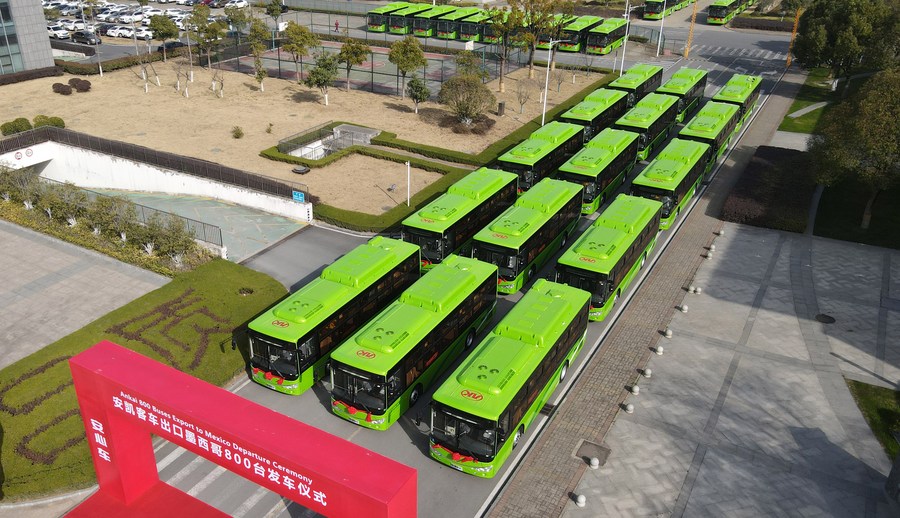 Aerial photo taken on March 8, 2022 shows the passenger buses to be delivered to Mexico at a factory of Anhui Ankai Automobile Co Ltd in Hefei, capital of East China's Anhui province. [Photo/Xinhua]
Aerial photo taken on March 8, 2022 shows the passenger buses to be delivered to Mexico at a factory of Anhui Ankai Automobile Co Ltd in Hefei, capital of East China's Anhui province. [Photo/Xinhua]
Thousands of Chinese-made cleaner vehicles revamping region's transport
Chinese-made eco-friendly buses are transforming Latin America's public transport infrastructure. Not only are they helping to cement ties with China, they are also lowering emissions in a region with a population of more than 600 million people.
In March, a batch of 800 buses powered by natural gas arrived in Monterrey, Mexico's third-largest city. The buses were manufactured by Anhui Ankai Automobile. The company, in Hefei, Anhui province, exported the largest batch of buses China has ever sent to Mexico.
Monterrey, with a population of 1.1 million, will benefit from modern buses with onboard Wi-Fi and incorporated technologies that will take the city's public transport system to the next level.
"With the continuous growth of its urban population, Monterrey is replacing its traditional-energy city buses to provide a more environmentally friendly travel solution," according to China Yuchai International, the company that developed the vehicles' engines, called YC6GN. "Monterrey is also an important industrial and business hub with a number of large Mexican and international companies operating there."
China Yuchai said the YC6GN engines provide green energy in compliance with the Euro V and Chinese National-V emission standards.
Farther south, in Colombia, Shenzhen's BYD delivered 172 electric buses in February to Bogota. The Colombian capital is building up a fleet of hundreds of electric public buses.
"Undoubtedly, delivering the first fleet of electric public transportation buses in the country, with 64 units to the Metroplus system in Medellin in 2019, opened the door to tenders such as the TransMilenio Bus Rapid Transit system in Bogota in 2021, where we were awarded more than 1,400 units to be delivered in the course of 2022," Juan Felipe Velasquez, commercial manager at BYD Colombia, told China Daily. He said this makes Colombia's fleet of BYD electric buses the company's largest outside China.
A 2021 report from the United Nations Environment Programme said: "The transport sector in Latin America and the Caribbean is characterized by a high concentration in urban areas, high per capita bus utilization rates and the use of trucks for freight transport.
"These conditions, together with having one of the cleanest energy mixes in the world, provide a unique advantage for the transition of the transport sector to electrification."
According to ANDEMOS, Colombia's National Association of Sustainable Mobility, 416 electric, hybrid and plug-in hybrid buses were registered in Colombia in 2021, and a similar figure for new registrations was seen in just the first two months of this year. All 417 electric buses registered in January and February were delivered by BYD.
"With the delivery of the whole batch of the BYD electric buses, Colombia will consolidate its leadership in electric vehicles in Latin America," said Olivero Garcia, the president of ANDEMOS.
Garcia said that for the electric buses in a city like Bogota, infrastructure deployment is needed in parallel. He added that Chinese companies are also working on building a metro system for the capital.
Jeronimo Marulanda, a consultant at Cuatro Elementos, an environmental consultancy and management firm in Colombia, said: "The great challenge ahead in Latin America is to achieve progress in the infrastructure for these vehicle fleets to operate optimally, as well as to have the infrastructure to receive and manage these bus fleets."
Mexico and Colombia are not the only countries in the region moving toward green public transportation.
"Costa Rica has made considerable progress: enviable charging infrastructure and a growing interest of the population in acquiring electric vehicles. We will have six electric buses thanks to a donation from the People's Republic of China," Costa Rica's First Lady Claudia Dobles said in a statement in February.
For Marulanda, the acquisition of electric bus fleets in Latin America is a step in the right direction, with a tangible impact on the environment that can help the region advance rapidly in the transition to sustainable mobility.
The writer is a freelance journalist for China Daily.
